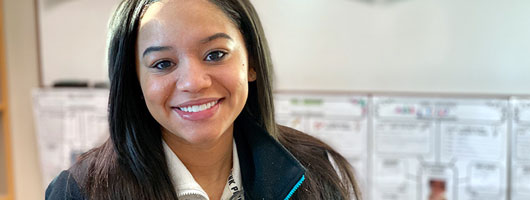 Pictured | Skylar Thomas | Elementary Education, Early Childhood | South Bend, Indiana (hometown)
Pictured | Skylar Thomas | Elementary Education, Early Childhood | South Bend, Indiana (hometown)
Bachelor of Science in Education/Elementary Education
The IU South Bend School of Education offers a Bachelor of Science in Education/Elementary Education. The Elementary Education program provides coursework and field experiences to prepare future teachers to meet the needs of students in today’s schools. The program is designed to prepare teacher education candidates to teach children in kindergarten through six grade.
Elementary Education candidates are generalists. They take a variety of content courses, professional foundation courses, and method courses to meet the content areas taught in the elementary schools.
Academic Advising
College policy on advising requires that students meet with their academic advisors at least once each year, and in some departments, prior to each semester’s to enrollment. Advising holds are placed on all School of Education students prior to advance registration and are released following advising appointments. Students with a declared major are advised in their academic units. To determine who your advisor is and how to contact them, see One.IU.
Degree Requirements (120 cr.)
Degree Map >>
Students receiving the Bachelor of Science in Education, Elementary Education must complete 120 total credit hours including:
- IU South Bend Campuswide General Education Curriculum (54 cr.)
- Professional Education Requirements (54 cr.)
- Concentration Requirements (12 cr.)
- An overall GPA of 2.75 is required for admission into the Teacher Education Program (TEP). Prior to admission to a teacher preparation program in the state of Indiana, candidates are required to pass a basic skills examination.
- Students must successfully complete EDUC-F 201/202, EDUC-H 340, EDUC-K 205, EDUC-M 311, EDUC-P 250, EDUC-Q 200, EDUC-R 301, EDUC-W 200, and EDUC-W 310.
- All Elementary Education majors must take the Pearson licensure tests in pedagogy and content prior to graduation.
- All courses are 3 cr., unless otherwise noted
Professional Education Requirements (54 cr.)
- EDUC-E 325 Social Studies in the Elementary Schools
- EDUC-E 327 Social Studies Methods and the Family: Focus on Young Children
- EDUC-E 328 Science in the Elementary Schools
- EDUC-E 343 Mathematics in the Elementary Schools
- EDUC-E 370 Language Arts and Reading I
- EDUC-E 371 Language Arts and Reading II
- EDUC-E 372 Language Arts and Reading III
- EDUC-K 205 Introduction to Exceptional Children
- EDUC-K 305 Teaching the Exceptional Learner in the Elementary School
- EDUC-M 101 Laboratory/Field Experience (2 cr.)
- EDUC-M 301 Laboratory/Field Experience (2 cr.)
- EDUC-M 401 Laboratory/Field Experience (2 cr.)
- EDUC-M 420 Student Teaching Seminar (2 cr.)
- EDUC-M 425 Student Teaching: Elementary (5 cr.)
- EDUC-M 425 Student Teaching: Elementary (5 cr.)
- EDUC-Q 200 Introduction to Scientific Inquiry
- HIST-H 105 American History I
- PSY-P 316 Psychology of Childhood and Adolescence
Concentration Requirements (12 cr.)
Elementary education candidates are expected to complete courses leading to a concentration. Currently, candidates can complete a concentration/minor in Early Childhood Education or English Language Learners.
Select one of the following concentrations:
Early Childhood (with Certification) (18 cr.)
(6 cr. fulfilled by Professional Education Requirements)
- EDUC-E 317 Practicum in Early Childhood Education
- EDUC-E 327 Social Studies Methods and the Family: Focus on Young Children
(fulfilled by Professional Education Requirements) - EDUC-E 330 Infant Learning Environments; AND
EDUC-M 101 Laboratory/Field Experience (0 cr.) - EDUC-E 333 Inquiry in Mathematics and Science
- EDUC-E 335 Introduction to Early Childhood Education
- EDUC-E 370 Language Arts and Reading I
(fulfilled by Professional Education Requirements)
English Language Learners (ENL with Certification) (27 cr.)
(15 cr. fulfilled by Professional Education Requirements)
- EDUC-E 370 Language Arts and Reading I (fulfilled by Professional Education Requirements)
- EDUC-E 371 Language Arts and Reading II (fulfilled by Professional Education Requirements)
- EDUC-E 372 Language Arts and Reading III (fulfilled by Professional Education Requirements)
- EDUC-H 340 Education and American Culture (fulfilled by Professional Education Requirements)
- EDUC-L 436 Methods and Materials for Teaching English as a Second Language; AND
EDUC-M 401 Laboratory/Field Experience (1 cr.) - EDUC-L 482 Student Teaching- English as a Second Language (5 cr.)
- EDUC-P 407 Psychological Measurement in the Schools
- EDUC-X 470 Psycholinguistics for Teachers of Reading
Special Education (28 cr.)
(16 cr. fulfilled by Professional Education Requirements)
- EDUC-K 205 Introduction to Exceptional Children
(fulfilled by Professional Education Requirements) - EDUC-K 305 Teaching the Exceptional Learner in the Elementary School
(fulfilled by Professional Education Requirements) - EDUC-K 345 Academic and Behavioral Assessment of the Mildly Handicapped Child
- EDUC-K 362 Team Approaches to the Education of Students with Disabilities
(fulfilled by Professional Education Requirements) - EDUC-K 370 Introduction to Language and Learning Disorders
- EDUC-K 452 Classroom Management
- EDUC-K 480 Student Teaching in Special Education
- EDUC-M 420 Student Teaching Seminar (2 cr.)
- EDUC-M 425 Student Teaching: Elementary (7 cr.)